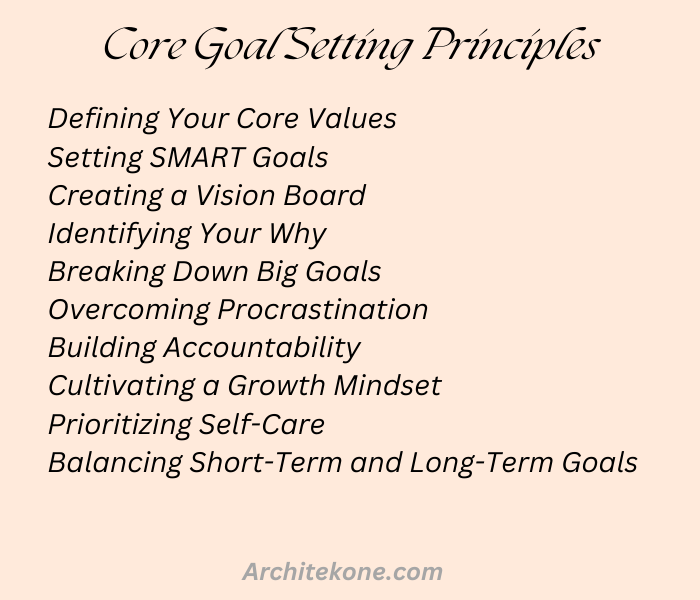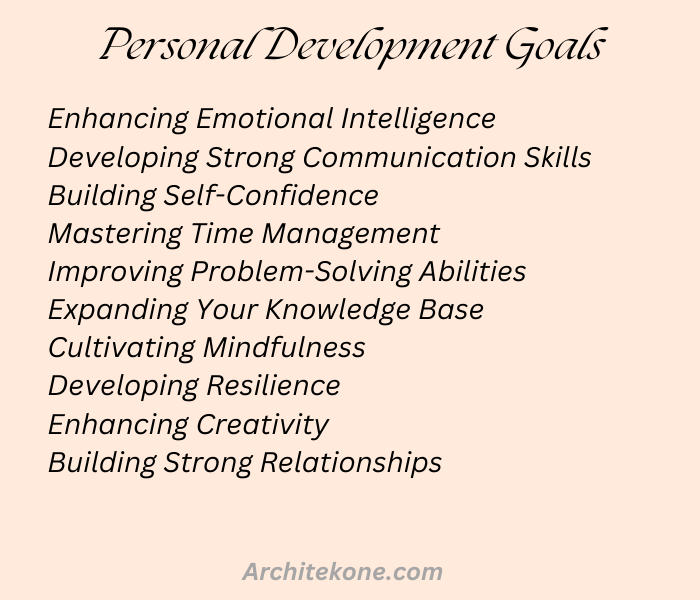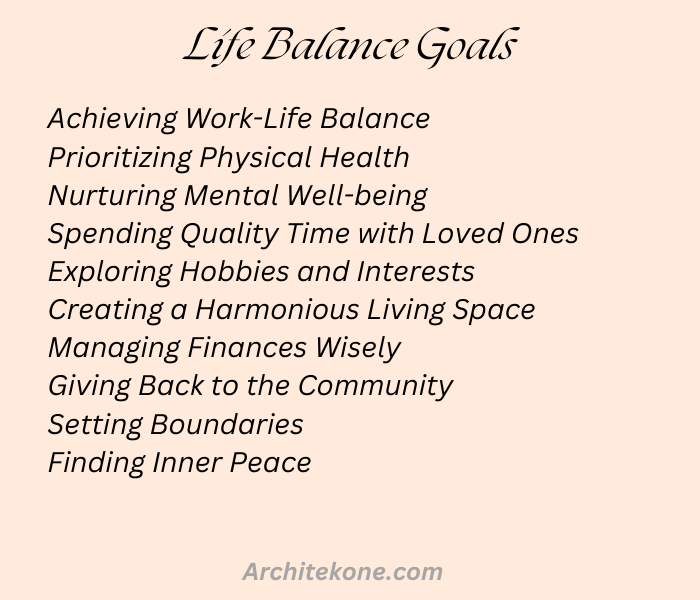Life is a journey, and like any journey, having a destination in mind provides direction and purpose. This is where goal setting comes in. It’s the compass that guides us through the labyrinth of life, helping us navigate challenges, make informed decisions, and ultimately, achieve our full potential.
Goals are more than just aspirations; they are the building blocks of personal growth. They provide a sense of focus, motivation, and accomplishment. Whether you desire career advancement, improved relationships, enhanced well-being, or a deeper sense of purpose, setting clear and attainable goals is the first step towards realizing your dreams.
By defining what you want to achieve, you empower yourself to take control of your life. Goal setting is not about perfection; it’s about progress. It’s about celebrating small victories along the way and learning from setbacks. Through the process of goal setting, you gain self-awareness, develop resilience, and cultivate a growth mindset.
Let’s embark on this journey together to explore effective goal-setting strategies, overcome common challenges, and unlock the extraordinary potential within you.
Core Goal Setting Principles

Defining Your Core Values
Understanding your core values is fundamental to goal setting. These values act as a compass, directing your choices and ensuring your goals align with what truly matters to you. By identifying your core values, you create a foundation for setting meaningful and fulfilling objectives.
Setting SMART Goals
SMART goals are Specific, Measurable, Achievable, Relevant, and Time-bound. This framework provides a structured approach to goal setting, ensuring clarity, focus, and accountability.
Creating a Vision Board
A vision board is a visual representation of your goals and aspirations. It serves as a constant reminder of what you’re working towards, inspiring motivation and focus. By creating a visually appealing collage of images and words, you can tap into the power of visualization to propel you forward.
Identifying Your Why
Understanding your ‘why’ is crucial for long-term motivation. Delving deep into your reasons for pursuing a goal can provide the emotional fuel needed to overcome challenges and setbacks. Connecting your goals to your larger purpose can significantly increase your commitment and resilience.
Breaking Down Big Goals
Large, overarching goals can seem daunting. Breaking them down into smaller, more manageable steps can make them less overwhelming and increase your sense of accomplishment as you achieve each milestone. This approach also provides flexibility to adjust your plan as needed.
Overcoming Procrastination
Procrastination is a common obstacle to goal achievement. Developing strategies to overcome it is essential. Techniques such as time management, breaking tasks into smaller chunks, setting rewards, and identifying and addressing underlying causes of procrastination can help you stay on track.
Building Accountability
Sharing your goals with others or finding an accountability partner can increase your commitment to achieving them. Having someone to check in with regularly can provide support, encouragement, and help you stay focused.
Cultivating a Growth Mindset
A growth mindset believes in the ability to develop new skills and abilities through dedication and hard work. Embracing a growth mindset empowers you to view challenges as opportunities for learning and growth, fostering resilience and adaptability.
Prioritizing Self-Care
Taking care of your physical and mental well-being is essential for sustained goal achievement. Incorporating self-care practices into your routine helps prevent burnout, improves focus, and enhances overall performance.
Balancing Short-Term and Long-Term Goals
It’s important to strike a balance between immediate and long-term objectives. While short-term goals provide quick wins and motivation, long-term goals offer a sense of direction and purpose. By aligning short-term goals with your larger vision, you can create a roadmap for success.
Personal Development Goals

Enhancing Emotional Intelligence
Visualization can help you identify, understand, and manage your emotions effectively. By visualizing yourself handling challenging situations calmly and rationally, you can develop emotional resilience and build stronger relationships.
Developing Strong Communication Skills
Visualizing successful communication scenarios can boost your confidence and improve your ability to express yourself clearly and effectively. You can practice active listening, assertive communication, and conflict resolution through visualization.
Building Self-Confidence
Visualization is a potent tool for building self-belief. By imagining yourself succeeding in different areas of life, you can gradually enhance your self-esteem and overcome self-doubt.
Mastering Time Management
Visualizing efficient time management strategies can help you prioritize tasks, set realistic goals, and create effective schedules. You can envision yourself effortlessly balancing work, personal life, and leisure activities.
Improving Problem-Solving Abilities
Visualization can stimulate creativity and help you find innovative solutions to challenges. By mentally exploring different approaches, you can develop a problem-solving mindset.
Expanding Your Knowledge Base
Visualizing yourself acquiring new knowledge and skills can boost your motivation to learn. You can envision yourself mastering new subjects, attending informative workshops, or engaging in stimulating discussions.
Cultivating Mindfulness
Visualization can be used to promote mindfulness and reduce stress. By focusing on the present moment and cultivating a sense of calm, you can improve your overall well-being.
Developing Resilience
Visualizing yourself overcoming obstacles and setbacks can strengthen your resilience. By practicing mental toughness, you can build the capacity to bounce back from challenges.
Enhancing Creativity
Visualization can stimulate your imagination and inspire creative thinking. By allowing your mind to wander freely, you can generate new ideas and find innovative solutions.
Building Strong Relationships
Visualizing positive interactions with others can help you build stronger connections. By practicing empathy and understanding, you can improve your communication and interpersonal skills.
Life Balance Goals

Achieving Work-Life Balance
Balancing professional and personal life is crucial for overall well-being. This involves setting clear boundaries, managing time effectively, prioritizing tasks, and delegating when necessary. It’s about finding a rhythm that allows for both career growth and personal fulfilment.
Prioritizing Physical Health
A healthy body supports a healthy mind. Regular exercise, a balanced diet, sufficient sleep, and regular check-ups are essential. It’s about nurturing your physical well-being through conscious choices and self-care.
Nurturing Mental Well-being
Mental health is equally important. Practices like meditation, mindfulness, and journaling can help manage stress, anxiety, and depression. Building resilience and seeking support when needed are also crucial for mental well-being.
Spending Quality Time with Loved Ones
Strong relationships enrich our lives. Dedicate quality time to family, friends, and loved ones. Engage in shared activities, communicate openly, and create lasting memories together.
Exploring Hobbies and Interests
Pursuing passions and hobbies fosters personal growth and creativity. Whether it’s painting, gardening, or learning a new language, engaging in activities you enjoy brings joy and fulfillment.
Creating a Harmonious Living Space
Your environment influences your mood. A tidy, organized, and aesthetically pleasing living space contributes to a sense of calm and well-being. Incorporate elements that inspire and uplift you.
Managing Finances Wisely
Financial security provides peace of mind. Create a budget, track expenses, save for the future, and avoid unnecessary debt. Financial planning empowers you to make informed decisions.
Giving Back to the Community
Contributing to the well-being of others creates a sense of purpose. Volunteer your time, support causes you believe in, or mentor others. Giving back enriches your life and strengthens your community.
Setting Boundaries
Establishing healthy boundaries is essential for protecting your time, energy, and emotional well-being. Learn to say no when needed, and communicate your needs and expectations clearly.
Finding Inner Peace
Inner peace is a journey, not a destination. Practices like meditation, yoga, and spending time in nature can cultivate a sense of calm and centeredness. Self-reflection and gratitude can also contribute to inner peace.
Final Thoughts
Setting and achieving goals is not merely about reaching a destination; it’s about the transformative journey itself. It’s about discovering your strengths, overcoming challenges, and cultivating a mindset of continuous growth. Remember, every small step forward brings you closer to your ultimate vision.
Embrace the power of goal setting to unlock your full potential. Celebrate your successes, learn from setbacks, and stay committed to your aspirations. Your journey is unique, and your achievements are within reach.
Now is the time to take action. Reflect on your aspirations, set clear goals, and create a roadmap for your future. With determination and perseverance, you can turn your dreams into reality.

